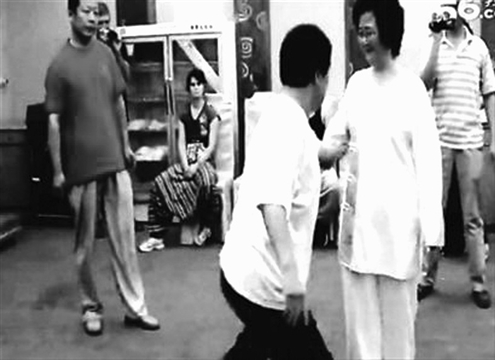Do not swindle in name of traditional culture
- By Cheng Manqi
 0 Comment(s)
0 Comment(s) Print
Print E-mail People's Daily, September 20, 2012
E-mail People's Daily, September 20, 2012
In a Chinese middle school textbook, an article titled "My Father's Illness," written by Chinese writer Lu Xun, had mentioned the "sugarcane going through three years of wind and frost" and "phoenix tree first feeling autumn air," which is an irony to the mystery of Chinese medicine.
|
|
|
Yan Fang(R2), "the first-generation disciple" of Taichi master Li Jingwu, is found to be a cheater. (Xinhua) |
In recent years, traditional Chinese culture such as "The Book of Changes," traditional Chinese medicine and Chinese martial arts, have gradually been revived and welcomed among people. However, among the people with various intentions to join the revival of traditional culture, many are like the "miracle-working" doctor in Lu Xun's article who were very famous but were actually cheaters.
Yan Fang, "the first-generation disciple" of Taichi master Li Jingwu, is one of these cheaters. In the video, master Yan looked calm and elegant when her disciples attacked her. All of the disciples that approached her were bounced back a few meters as Yan raised her hand. The clownish online video was immediately under fire and Yan was considered a cheater by many netizens.
In the television interview on Sept. 10, a CCTV reporter personally experienced the Kung Fu of Yan and confirmed that the suddenly popular Taichi master was really suspicious.
However, there are still many people who hype traditional culture that does not conform to scientific knowledge or lack scientific basis.
Hyping traditional culture is not a rare thing but rather a universal phenomenon since deific traditional culture has its place in a China currently experiencing rapid economic development and modernization. There are both commercial and political demands for it. In addition, social psychological reasons also help to explain the phenomenon.
From the point of view of business and markets, there really are people who believe such deceitful tricks. As long as these people exist, cheaters such as Yan will have followers and students. Zhang Wuben, a pseudo health expert from China, made fat profits for his theory of all-purpose mung beans and his best-selling book. Taoist priest Li Yi, another liar of traditional culture, had charged expensive fees to teach his disciples how to cultivate themselves, earning enough money to renovate and expand his Taoist temple. These "commercial celebrities" lying in between the "culture industry" and "frauds" can always win profiteering, and have numerous followers.
From the political point of view, many regions have turned "developing the culture industry" into "developing culture achievements" under the national policy of promoting the revival of traditional culture and developing the culture industry. The Gansu Provincial Health Department even opened a class to research “Primordial Qi.”
Some people say that it reflects the Chinese people's ignorance and superstition of not really accepting certain scientific concepts. This not only results from traditional concepts, and is not a rarity just in Chinese society and Chinese people. Many similar events have also occurred in Western society.
In the 1960s and 1970s, Western youth was addicted to cannabis, fantasies and mysticism. In addition, Scientology, which was founded in the 1950s, as well as all kinds of hypnotism, is still prevalent in the Western world. Many "ignorant," "mysterious" and "fantasy" resources have also been excavated and remolded in the long history of Western countries.
The pursuit of mystery and mysticism reflects people's resistance against modern life and the stylized way of life. Since the development of science and technology, people seem willing to believe from time to time that some unexplainable phenomena and ineffable things exist in the world.
The commercial hype and formalized revival of traditional culture also reflects a fickle social atmosphere during China's rapid modernization process. On the one hand, we should understand that it is an inevitable stage for China and even advanced countries have also gone through similar stages, while on the other hand, the public should have a rational understanding of traditional culture and keep a true warmth and respect for it.
When guiding the development of the culture industry, China should launch more specific policies to encourage real cultural innovation and crack down on behaviors such as swindling in the name of traditional culture.







Go to Forum >>0 Comment(s)